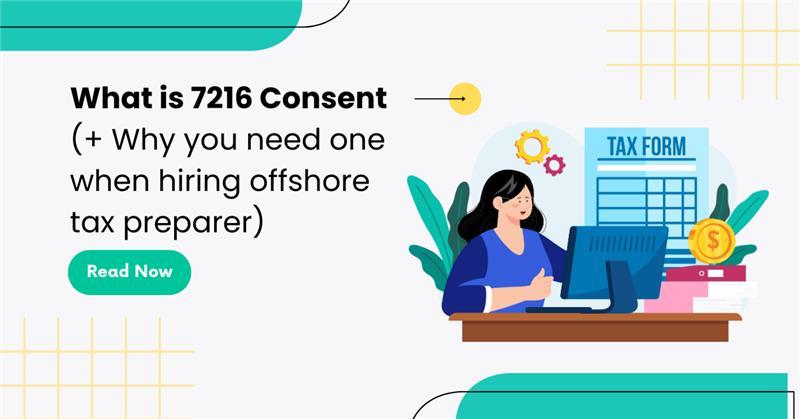
How Accountants Can Use AI Accounting Without Being Techy
No accountant wants to train AI and ML models. Yet, AI in accounting can’t be ignored. Learn how to use accounting AI without being technical.

If you’re running a tax firm and offering services in addition to tax prep—like estate planning, payroll, or tax strategy consulting—you need to get 7216 consent. If you’re outsourcing tax prep or working with an offshore tax preparer, you’ll need to attach another form to confirm that your client’s information is being shared with a preparer outside the United States.
Tax pros are aware of 7216 consent—a requirement under the Internal Revenue Code (IRC) Section 7216. It dictates how tax preparers handle and disclose taxpayer information, ensuring client privacy and legal compliance.
If you’re preparing tax returns for multiple clients, you’re considered a tax preparer and are bound by Section 7216. This means you must get written consent from your clients before using or sharing their tax info for anything beyond preparing their return.
The IRS requires this written consent to protect taxpayer confidentiality and prevent the unauthorized use of sensitive data.
A common misconception is that 7216 only applies to offshoring, but that’s not true. Whether you’re storing client information in the US or using software to process it elsewhere, you still need this consent.
Key Points:
Who needs it? Any third party handling taxpayer information.
Clarity in the form:
o What info is being disclosed?
o Why is it being shared?
o How long is the consent valid for?
o Who will receive the information?
Duration:
The consent is typically valid for one year, unless the client specifies otherwise. For compliance, it’s a good practice to renew this consent regularly to reflect any changes in client preferences.
7216 Consent often comes up because it’s tied to sending client information overseas. To help your clients feel more at ease with it, you need to change the narrative.
Start by explaining that the 7216 consent form is a legal requirement by the IRS. It allows tax preparers to use or disclose a client’s tax return information for purposes beyond just preparing their return.
Make it clear that without this consent, you can’t legally share or use their information for anything other than tax prep. This includes services like financial planning, sharing information with third parties, or even using software to enhance your services.
Clients can benefit from expanded services like financial planning, tax strategy, and more.
With 7216 consent, you can use data for personalized strategies, improving overall service.
The consent allows you to use advanced software to process and manage data efficiently, making your workflow smoother.
Without consent, clients miss out on valuable services and tax-saving strategies.
Tax prep becomes the only service you can legally provide without the consent, limiting client options.
Ensure clients understand that they retain control over what information is shared and who it’s shared with.
Be clear about how the consent will enable you to help them more effectively, such as sharing documents with financial institutions or using software.
Reassure clients that their data is safe, as all actions comply with strict IRS and data protection guidelines.
Make it simple for clients to sign the form securely online, avoiding paperwork hassle.
After they sign, send a copy of the consent form for their personal records, ensuring transparency and trust.
The IRS has strict rules in place because tax practitioners are prime targets for cybercriminals looking to steal sensitive tax information to file fraudulent returns. To protect both clients and tax preparers, the IRS has issued the Taxes-Security-Together Checklist.
When hiring an offshore tax preparer, it’s critical to ensure your service provider follows these security protocols. Plus, you’ll need to get an additional consent form confirming that both the U.S. tax preparer, who will disclose your SSN, and the offshore preparer receiving it, have proper data protection measures in place.
Security Measures to Ensure Protection:
Deploy the “Security Six” Measures:
o Activate anti-virus software to prevent malware attacks.
o Use a firewall to protect your system from unauthorized access.
o Opt for two-factor authentication wherever possible for extra security.
o Use backup software/services to protect data in case of loss or attack.
o Enable drive encryption to secure sensitive information stored on devices.
o Create and secure Virtual Private Networks (VPNs) to protect your internet traffic.
Make sure your offshore tax service provider is following these guidelines to safeguard your client’s sensitive data and avoid security risks.
One way to get consent as a part of the process is to include the form in the engagement letter.
You can opt DocuSign for this.
When including 7216 consent in your engagement letter, it’s important to ensure that it covers the following key elements to remain compliant:
“You are not required to complete this form to engage our tax return preparation services. If we obtain your signature on this form by conditioning our tax return preparation services on your consent, your consent will not be valid. If you agree to the disclosure of your tax return information, your consent is valid for the amount of time that you specify. If you do not specify the duration of your consent, your consent is valid for one year from the date of signature.“
Why it matters: Disabling USB ports on laptops is a simple but effective security measure that prevents unauthorized devices from being connected to the system. This reduces the risk of malware infections and data theft through external drives, which are common entry points for cyberattacks.
Why it matters: Endpoint protection ensures that all devices connected to the network (like laptops, desktops, and mobile devices) are secure. It includes antivirus software, firewalls, and real-time monitoring to detect and block any potential threats before they can affect your data or network.
Why it matters: Regular training helps employees recognize phishing attempts and other common social engineering tactics used by cybercriminals to steal sensitive data. By educating employees on how to identify suspicious emails and avoid risky online behaviors, the likelihood of successful attacks is significantly reduced.
Why it matters: ISO 2001 and SOC 2 certifications are industry-recognized standards for data security. These certifications demonstrate that Credfino follows rigorous security practices and protects client data through established security controls, ensuring compliance with global security standards.
Data Server Protection: This refers to the physical and technical safeguards in place to protect the servers where client data is stored, preventing unauthorized access, data breaches, and data loss.
Why it matters: Verito is a trusted service partner that supports Credfino in managing and securing client data. They provide additional layers of security and compliance, helping to ensure that client information is handled according to best practices and legal requirements.
Schedule a call if you are ready to hire an offshore tax preparer with Credfino.
If you’re looking to upsell services or expand your team globally, 7216 consent is non-negotiable. It’s a vital part of building trust and ensuring compliance as you scale.
When hiring offshore tax preparers through any staffing model, make sure to have this conversation with your clients upfront. It’s not just about following the rules—it’s about protecting your business and your client relationships as you grow.

No accountant wants to train AI and ML models. Yet, AI in accounting can’t be ignored. Learn how to use accounting AI without being technical.

You’ll see exactly what “Accounting AI” looks like in practice. We’ve structured it as a simple list of the 9 smartest ways firms like yours can use AI in accounting.

Still posting boring “get your books done” posts for marketing for CPA firm? STOP. Get inspiration for accounting social media posts that work + post angle inside